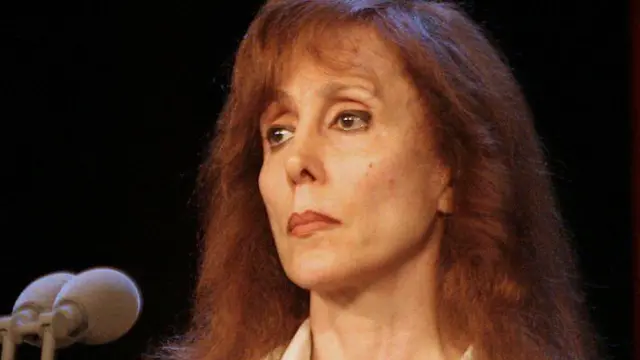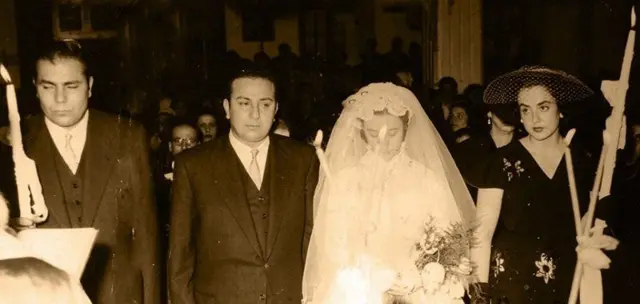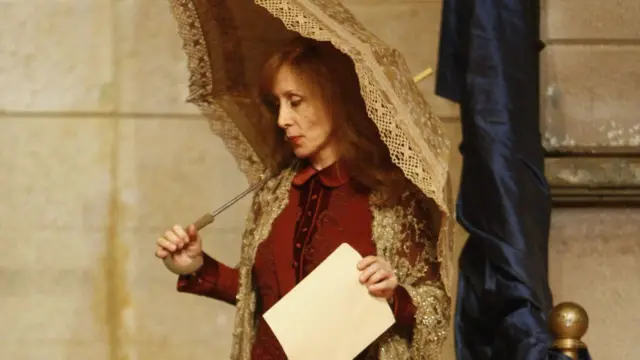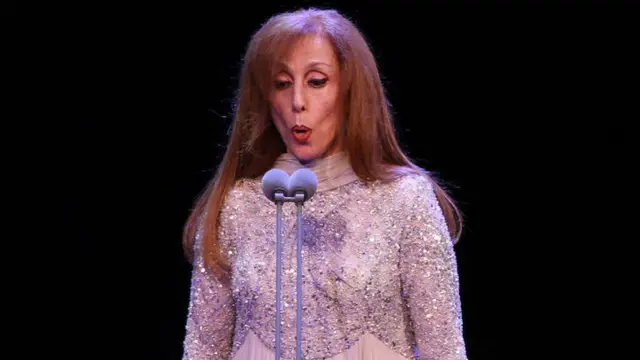
image source, HASAN MROUE
The Arab singing audience is celebrating the ninetieth anniversary of the birth of Jarat Al Qamar, who entertained her fans with authentic singing for decades until her songs became icons of love and romance.
She is “our ambassador to the stars”, “the legend of the Arabs”, “Yasmina of the Levant”, “the queen of Arab singing”, “the bird of the East”, “the enchanting voice”, “the lady of the morning”, “the voice of the nations”, and “the angelic voice”. Some of the titles held by the great Lebanese singer Fairouz, who continued to bring joy and calm to people with her beautiful voice.
Many generations opened their eyes this morning to Fairouz’s voice, whose gentleness and beauty still arouse feelings of joy, love, and tenderness in the souls of listeners.
Humble upbringing
Fayrouz, whose original name was Nihad Haddad, was born in the popular Zuqaq al-Blat area in Beirut in 1934 to a Christian family. Her father, Wadih Haddad, traces his lineage back to the city of Mardin in present-day southeastern Turkey, and he worked at the printing press of the Lebanese newspaper “L’Orient Le Jour,” which is published to this day in the language. French, and her mother is a Lebanese Maronite Christian named Lisa Bustani.
Nihad attended Saint Joseph’s School for Girls in Beirut, until the circumstances of World War II forced her father to transfer her to a public school.
In 1947, at the age of 14, she was discovered by Muhammad Fleifel, one of the founders of the National Conservatory of Music in Beirut, when he was looking for talents to include in a newly formed choral group. The Fleifel brothers took great care of Fayrouz and advised her not to eat anything that might harm her vocal cords. They also presented Fayrouz to the Music Institute and pledged to bear the expenses of her studies, where she studied for four years.

image source, NA
Radio Lebanon
The Fleifel brothers are credited with teaching Fairouz the basics of intonation and the melodic positions it contains that contributed to the development of her voice and performance.
After four years of studying at the institute, Fayrouz succeeded in a vocal test competition, where musician Halim Al Roumi was impressed by her voice and presented her with a group of melodies that resonated well. He gave her the name Fayrouz, which she has carried ever since.
She began her singing career as a member of the Lebanese Radio Band. She was sponsored by Al-Rumi, who was a composer and director on the radio at the time, after he admired her unique talent. He composed her own songs for her and gave her the artistic name Fairouz because her voice resembled a precious stone in his view.
Fairouz achieved great success with listeners everywhere in Lebanon. Fayrouz met the Rahbani brothers, Assi and Mansour, who were among the rising talents in the field of composition and lyric poetry at that time.
Although the two brothers were trying to combine Western dance tunes with Arabic singing, the song that achieved great success was a sad love song entitled “Reproach,” which they recorded in 1952 on Damascus Radio.
In July 1954, Fayrouz married Assi Rahbani, and their wedding was attended by a large crowd of fans. At the beginning of their lives, they lived in the town of Antelias overlooking Beirut.
Capital of art
In 1955, Fayrouz and Assi traveled to Egypt for the first time. At that time, Cairo was still the capital of Arabic theatre, cinema, and song, and the young singer enjoyed great success there and received many offers from famous Egyptian composers and directors. But by that time, she was expecting her first child, so she returned to Lebanon and gave birth to her eldest son, Ziad, in January 1957.
She later gave birth to four children, three girls and a boy. But Ziad was closest to her, and in later years he wrote and composed many of her songs.
Fairouz sang for the first time in front of an audience in the summer of 1957 during her participation in the annual Baalbek Festival, where the audience overwhelmed the stands of the Roman Temple of Jupiter. Until that date, the festival’s activities were limited to foreign performances. The President of the Republic, Camille Chamoun, awarded her the prestigious Lebanese Order of Knighthood in recognition of her artistic achievement.
After that, Fayrouz became an essential pillar of the festival’s performances, as thousands of people from Lebanon and elsewhere flocked to the festival to watch the latest plays and musical performances written and composed by the Rahbani brothers.
The annual festival stopped with the outbreak of the civil war in 1975.

image source, RAMZI HAIDAR
Fayrouz’s fame spread outside Lebanon and she now has fans in all Arab countries and the diaspora. Offers poured in from musicians, composers and poets from all countries. She also performed concerts in most Arab countries, capitals, and major cities around the world, such as New York, Sydney, San Francisco, Montreal, London, and Paris.
The late King of Jordan, Hussein, awarded her the Medal of Honor in 1963 and the Gold Medal in 1975.
Fairouz sang for love, estrangement, nature, homeland, ancient Jerusalem, and Palestine.
She also sang various forms of singing, poems, muwashahat, maqam, mawal, ataba, meghna and folklore.
The number of musical plays performed by Fairouz reached 22 works, in addition to three musical films directed by Egyptians Youssef Shaheen and Henry Barakat. Some of Fayrouz’s best and most famous songs that the audience knew through her musicals: Bridge of the Moon in 1962, Baya al-Khawatim in 1964, Wheels of Love in 1965, and Al-Mahatta 1973.
In 1967, Fayrouz presented the play “Hala and the King,” prepared and directed by the Rahbani brothers, whose events take place in the city and not in the village, as was usual in her previous plays. The late singers Nasri Shams El Din, Melhem Barakat, Elie Choueiri and Joseph Nassif participated in it.
Fayrouz refused to leave Lebanon during the civil war and remained in Beirut, distancing herself from the atmosphere of internal conflicts, but she continued to sing for Lebanon and its people. Fayrouz lived in West Beirut, which was under the control of nationalist and leftist parties and forces, while Christian forces controlled East Beirut at the time. The combatants stopped the war so that people could participate in Assi Rahbani’s funeral in 1986, when his body was transported to East Beirut to pray over him in the church and bury him there.
Assi’s health had deteriorated several years before his death. Fayrouz began cooperating with her son Ziad, who wrote and composed a number of song groups for her, starting with “I Know You” in 1987 and “How Are You” in 1991.
In 1973, Ziad composed the song “People Asked Me” when he was seventeen years old. The song was a great success, and the audience was astonished by the seventeen-year-old’s musical sobriety. After that, the plays and song groups that Ziad wrote for his mother followed, such as the album “Wahdan” in 1979 and the album “My Knowledge of You.” ” in 1987 and the album “How Are You” in 1991, one of the most prominent musical plays that Fairouz sang from “Nazul Al-Surour” was composed by Ziad in 1974, and it was preceded by the play “Sahria” in 1973.

image source, ANWAR AMRO
In the 1990s, Fayrouz released six albums (two in honor of the late composer Philemon Wehbe), three albums by Ziad Rahbani, and an album in tribute to Assi Rahbani prepared by Ziad Rahbani.
Her first album in the new millennium, “Wala Kif,” was released in 2002, and on January 28, 2008, Fairouz sang at the Opera House in Damascus, where she played the starring role in the musical “Sah al-Num” after more than two decades of absence from Syria as part of a celebration. UNESCO classified Damascus as the Capital of Arab Culture that year.
The album “A Fi Amal” was released on October 7, 2010 and was written and prepared by Ziad Rahbani. As for her last album, it was titled “Babali” and was released on September 22, 2017. It was prepared by her daughter, Rima Rahbani. The album received some criticism for quoting melodies and lyrics from popular Western songs.

